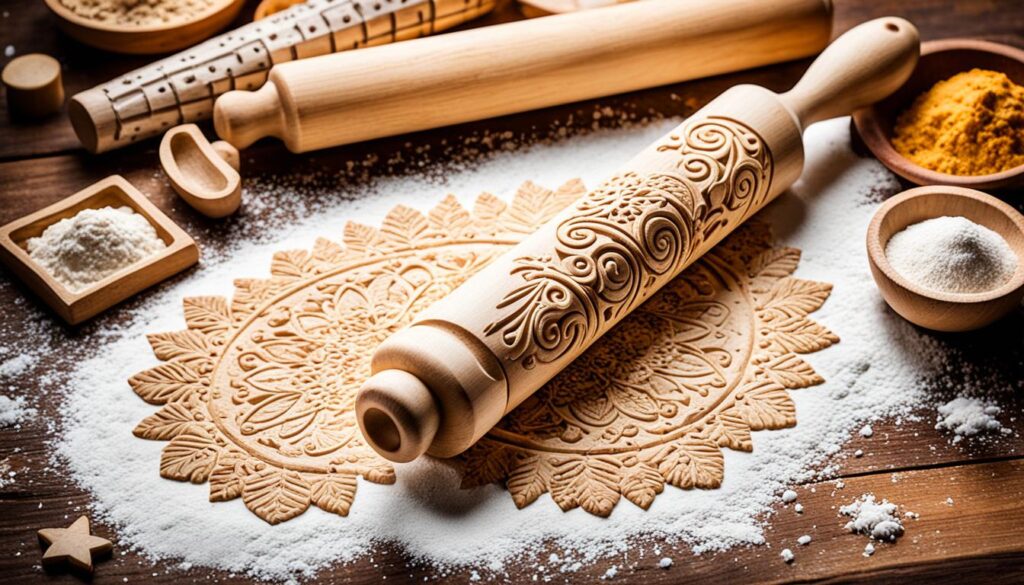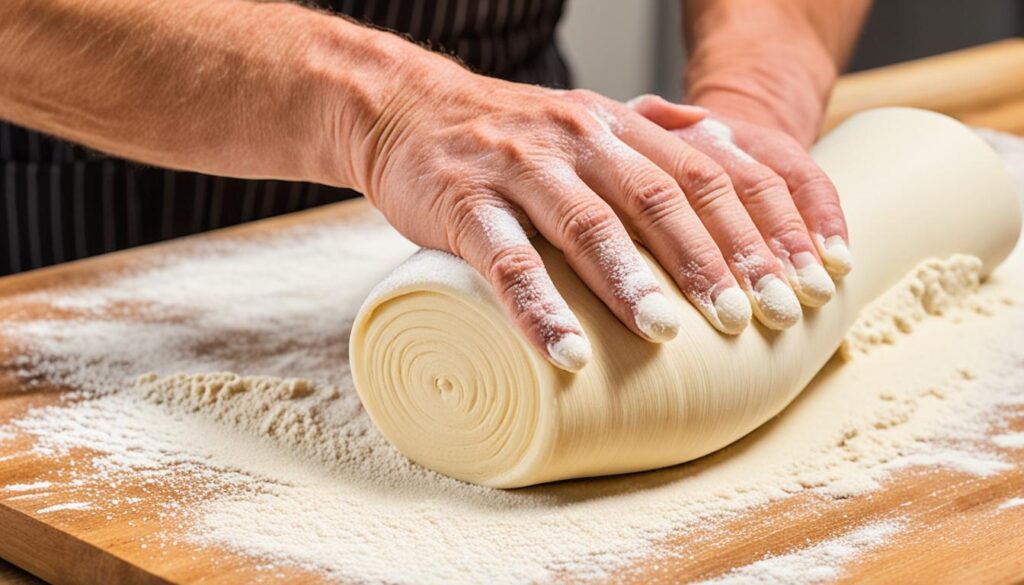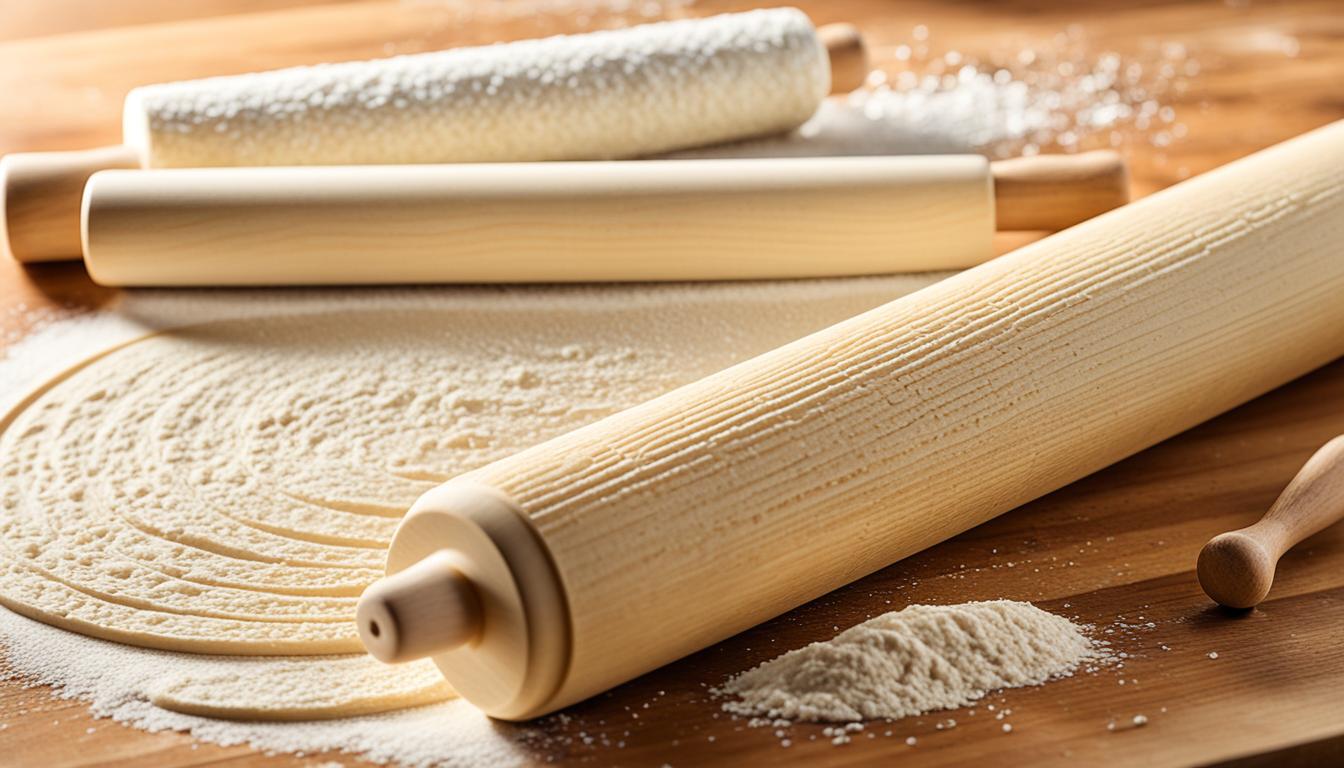Are you tired of struggling with unevenly rolled doughs that ruin your baked goods?
Have you ever wondered if there is a secret to achieving perfectly smooth and uniform dough every time?
If you’re on the quest for the best rolling pin that will elevate your baking experience, you’ve come to the right place.
In this article, we will explore the key factors to consider when choosing a rolling pin, including size, weight, material construction, and design. We will also delve into the different types of rolling pins available and their unique features. By the end, you’ll have the knowledge you need to select the perfect rolling pin for your baking needs.
Key Takeaways:
- Choosing the best rolling pin involves considering factors such as size, weight, material construction, and design.
- There are different types of rolling pins, each offering specific benefits and features.
- The material of the rolling pin can impact its performance and maintenance.
- Expert tips can help you select a rolling pin that suits your specific baking needs.
- By taking into account these factors, you can find the perfect rolling pin to elevate your pastry making.
Different Types of Rolling Pins and Their Features
When it comes to choosing a rolling pin, it’s important to consider the different types available and their unique features. Each type offers distinct advantages that cater to specific baking needs. Let’s explore the top-rated rolling pins and factors to consider when making your selection.
1. Handled Rolling Pins
Handled rolling pins are the most commonly used type. They feature handles on both ends, providing stability and ease of use. The handles offer a comfortable grip, allowing for better control while rolling out dough. These rolling pins are suitable for various baking tasks and are ideal for beginners.
2. French Rolling Pins (Tapered and Straight)
French rolling pins are known for their versatility and ability to manipulate dough in all directions. They come in two variations: tapered and straight. Tapered French rolling pins have tapered ends that make it easier to create perfectly round and evenly thin dough. Straight French rolling pins are ideal for rolling out larger amounts of dough and provide a consistent thickness throughout.
3. Textured Rolling Pins
Textured rolling pins are designed for decorative purposes. They feature patterns or designs engraved on the surface, allowing you to create intricate textures on your dough. These rolling pins are perfect for adding unique details to pies, cookies, and pastries, making them visually appealing and delightful.
4. Precision Rolling Pins
Precision rolling pins are specially designed for precise baking tasks that require specific measurements. They come with adjustable rings or removable discs that allow you to roll out dough to a specific thickness. These rolling pins are commonly used for making delicate pastries, such as puff pastry or croissants, where precise thickness is crucial for achieving excellent results.
When choosing a rolling pin, consider the type that best suits your baking needs. Whether you prioritize stability, versatility, decorative detailing, or precision, there is a rolling pin available to enhance your baking experience.
Different Materials Used in Rolling Pins and Their Pros and Cons
When it comes to rolling pins, the choice of material can significantly impact your baking experience. Here, we will explore the different materials used in rolling pins and their respective pros and cons, helping you make an informed decision.
Wooden Rolling Pins

Wooden rolling pins are a popular choice among bakers due to their versatility. They come in various types of wood, such as beech, maple, and bamboo. Here are the pros and cons of wooden rolling pins:
| Material | Pros | Cons |
|---|---|---|
| Wood | 1. Versatile and suitable for various types of dough. | 1. Require careful handling and maintenance. |
Marble Rolling Pins
Marble rolling pins are not only functional but also aesthetically pleasing. They are commonly used for working with laminated dough. Let’s take a look at their pros and cons:
| Material | Pros | Cons |
|---|---|---|
| Marble | 1. Provides a naturally cool surface, ideal for working with temperature-sensitive dough. | 1. Heavier than other materials, which may require more effort when rolling. |
Metal Rolling Pins
Metal rolling pins are known for their excellent balance and low maintenance. They offer a smooth texture that allows for effortless rolling. Here are the pros and cons of metal rolling pins:
| Material | Pros | Cons |
|---|---|---|
| Metal | 1. Well-balanced and easy to maneuver. | 1. Can be heavier compared to other materials. |
Other Materials
In addition to wood, marble, and metal, there are other materials used for rolling pins, each with its own unique benefits:
- Plastic: Lightweight and dishwasher-safe.
- Glass: Provides a sleek and smooth surface, but can be fragile.
- Silicone: Non-stick and easy to clean, perfect for working with sticky dough.
Consider your needs and preferences when selecting a rolling pin. The material you choose will play a crucial role in achieving the desired results in your baking endeavors.
Expert Tips for Selecting the Perfect Rolling Pin
When it comes to selecting the best rolling pin for your baking needs, there are a few expert tips to keep in mind. Consider factors such as weight, size, and design that will ensure optimal performance and ease of use.
For pastry, a French rolling pin with tapered edges is often the preferred choice. The tapered design allows for precise control and easy manipulation of the dough, ensuring consistent thickness and even results. The elongated shape of the French rolling pin also enables effortless movement across the dough, minimizing the risk of overworking it.
“The tapered edges of a French rolling pin make it incredibly versatile and perfect for pastry. It allows for better control and precision when rolling dough, resulting in beautifully flaky and tender pastries.” – Michelle Palazzo, Pastry Director
Furthermore, it’s essential to choose a rolling pin that feels comfortable and easy to work with. Consider the weight of the rolling pin, as it can significantly impact your experience. A rolling pin that is too heavy may cause fatigue, while one that is too light may require excessive pressure to achieve desired results. Try holding different rolling pins to find the one that feels most comfortable in your hands.
Additional features such as engraved measurements or embossed patterns can also enhance your baking experience. Engravings allow for precise measurement of rolled dough, while embossed patterns can add a touch of elegance and decorative flair to your creations.

Remember, selecting the perfect rolling pin is a personal choice. Choose one that suits your baking style and preferences. Whether you opt for a traditional French rolling pin or explore other options, such as handled or textured rolling pins, the right choice will elevate your pastry making to new heights.
Conclusion
Choosing the best rolling pin for your baking needs is essential for achieving perfect pastries and dough. To ensure you make the right choice, consider key factors such as size, weight, material construction, and design. Our expert tips recommend opting for a beechwood rolling pin that is approximately 20 inches long, as it offers versatility and durability.
Additionally, take into account the type of rolling pin that suits your baking style – whether it’s a handled rolling pin for stability, a French rolling pin for versatility, a textured rolling pin for decorative purposes, or a precision rolling pin for precise tasks. Each type offers unique benefits that can enhance your baking experience.
Consider the material of the rolling pin as well. Wooden rolling pins are versatile but require careful handling, while marble rolling pins are ideal for laminated dough. Metal rolling pins offer balance and ease of use, while materials like plastic, glass, and silicone provide their own advantages.
By carefully considering these factors and our expert tips, you can confidently select the best rolling pin for your baking endeavors. Elevate your pastry-making skills by choosing a rolling pin that complements your needs and preferences, ensuring delicious and beautifully crafted treats every time.
